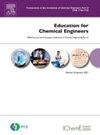了解影响化工热力学专业本科生成绩的因素
IF 2.3
2区 教育学
Q1 EDUCATION, SCIENTIFIC DISCIPLINES
引用次数: 0
摘要
本研究从个人因素、制度因素、社会因素和外部因素四个方面探讨影响化学工程热力学学生成绩的因素。我们研究了教学策略、课程设计和同伴合作在提高学生成功方面的作用。成功的关键预测因素包括解决问题的信心、内在动机和坚实的先决知识基础。有效的教学策略,如结构合理的课程设计、概念的实际应用、及时的反馈和引人入胜的讲座,可以显著提高学生的理解能力和学习成绩。同侪合作、教师可及性和积极的课堂环境进一步支持学生的参与和坚持。外部挑战也会影响结果,并强调需要灵活的学术政策和强有力的学生支持服务。该研究强调了全面和以学生为中心的方法的重要性,该方法将高质量的教学、结构化的学习环境和全面的支持系统相结合,以培养适应力、深化学习并确保长期成功。化学工程热力学的成功取决于信心、动机、坚实的基础和支持系统。教学策略、课程设计和同伴合作是关键。一个全面的,以学生为中心的方法培养韧性,参与和长期的成功。本文章由计算机程序翻译,如有差异,请以英文原文为准。
Understanding the factors influencing undergraduate performance in chemical engineering thermodynamics
This study investigates the factors influencing student performance in Chemical Engineering Thermodynamics, focusing on personal, institutional, social, and external factors. We examine the role of teaching strategies, course design, and peer collaboration in enhancing student success. Key predictors of success include confidence in problem-solving, intrinsic motivation, and a strong foundation in prerequisite knowledge. Effective teaching strategies, such as well-structured course design, practical application of concepts, timely feedback, and engaging lectures, significantly enhance comprehension and academic performance. Peer collaboration, instructor accessibility, and a positive classroom environment further support student engagement and persistence. External challenges also impact outcomes and underscore the need for flexible academic policies and robust student support services. The study highlights the importance of a holistic and student-centered approach that integrates high-quality instruction, structured learning environments, and comprehensive support systems to foster resilience, deepen learning, and ensure long-term success.
Tweetable Abstract
Success in Chemical Engineering Thermodynamics depends on confidence, motivation, strong foundations, and support systems. Teaching strategies, course design, and peer collaboration are key. A holistic, student-centered approach fosters resilience, engagement, and long-term success.
求助全文
通过发布文献求助,成功后即可免费获取论文全文。
去求助
来源期刊

Education for Chemical Engineers
Multiple-
CiteScore
8.80
自引率
17.90%
发文量
30
审稿时长
31 days
期刊介绍:
Education for Chemical Engineers was launched in 2006 with a remit to publisheducation research papers, resource reviews and teaching and learning notes. ECE is targeted at chemical engineering academics and educators, discussing the ongoingchanges and development in chemical engineering education. This international title publishes papers from around the world, creating a global network of chemical engineering academics. Papers demonstrating how educational research results can be applied to chemical engineering education are particularly welcome, as are the accounts of research work that brings new perspectives to established principles, highlighting unsolved problems or indicating direction for future research relevant to chemical engineering education. Core topic areas: -Assessment- Accreditation- Curriculum development and transformation- Design- Diversity- Distance education-- E-learning Entrepreneurship programs- Industry-academic linkages- Benchmarking- Lifelong learning- Multidisciplinary programs- Outreach from kindergarten to high school programs- Student recruitment and retention and transition programs- New technology- Problem-based learning- Social responsibility and professionalism- Teamwork- Web-based learning
 求助内容:
求助内容: 应助结果提醒方式:
应助结果提醒方式:


